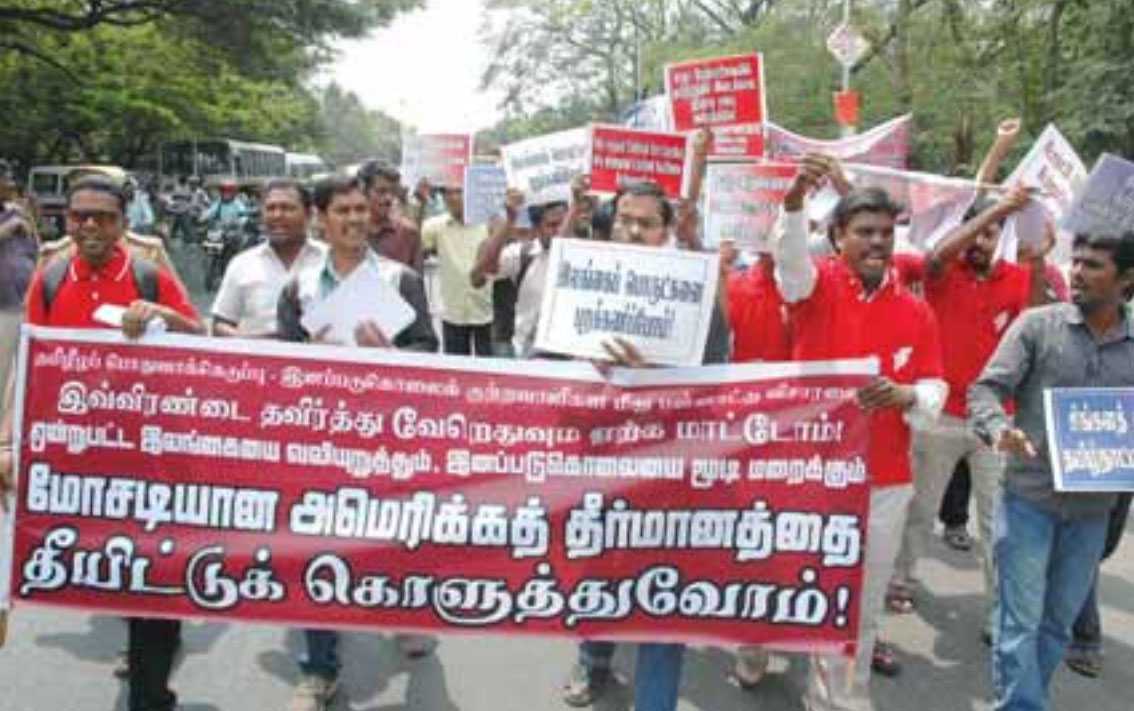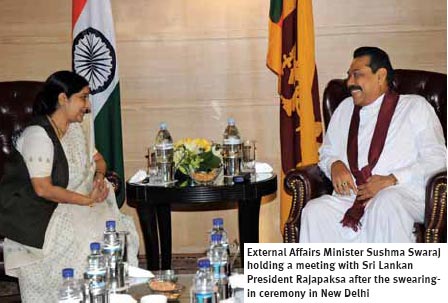RIDING the crest of an emphatic mandate, Prime Minister NarendraModi has taken charge and has hit the ground running. The Union Cabinet has been put together. On the domestic front, Special Investigation Team (SIT) has been formed to hunt down the black money, its hoarders and launderers. Ministers are busy dusting files and formulating a development-driven governance agenda.
On the external front, all SAARC leaders were hosted at the swearing-in and a strong message of regional cooperation has been sent out. The suave and sober SushmaSwaraj has assumed charge as the Minister of External Affairs, who will be ably assisted by the hard-core professional, General (Retd) VK Singh, as the Minister of State.
Setting the agenda for future parleys with the Government of Sri Lanka (GoSL) Prime Minister Modi asked President M Rajapaksa to expedite the reconciliation process, assure full implementation of the 13th Amendment and find an expeditious solution to the vexing fishermen issues. Modi exhorted Rajapaksa to resolve these pending issues in a manner that meets the aspirations of the Tamil community for a life of equality, justice, peace and dignity in a united Sri Lanka.
Foreign Minister SushmaSwaraj and her team are expected to build on this dialogue and take it further with vigour. In this, she will be facilitated by the positive response to her appointment in Sri Lanka, cutting across ethnic and party divisions. The general consensus on the island is that Swaraj has good knowledge of international relations and will do a great job as Foreign Minister. The perception is that Swaraj has hands-on experience as regards Sri Lanka and will play a positive role in India-Lanka relations.
From the GoSL side, President Rajapaksa had earlier responded to Modi’s victory by congratulating him and inviting him on a State visit to the island. Colombo also dropped hints that the Rajapaksa government’s relations with the Congress party led-UPA government had soured over the years because it had backed two UN Human Rights Council resolutions against Sri Lanka while it abstained from voting during the US-backed resolution in March 2014. This is a deliberate spin and the fact is that the UPA government pandered and protected Rajapaksa and his government like a mother hen!
Rajapaksa anticipated a backlash from the Tamils of Tamil Nadu if he visited Delhi. So, in order to convey to Delhi that the Tamils of Sri Lanka are with him, Rajapaksa asked the Chief Minister of Sri Lanka’s Northern Province, CV Wigneswaran, to be part of the delegation and got a right royal snub. Wigneswaran said that there was no strong, cooperative spirit prevailing between the Sinhalese Centre and the Tamil province and that the people of the Northern Province were fearful of heavy militarisation. “I would be guilty of facilitating tokenism were I to accept such an invitation,” Wigneswaran wrote in thisletter to Rajapaksa.
THE backlash in Tamil Nadu did take a furious shape and every political party and protest groups, including the students, opposed the move. So much so, Chief Minister J Jayalalithaa, who had packed her bags to travel to Delhi to attend the swearing-in of her ‘natural ally’, backed out and boycotted the function. She trashed Modi’s invitation to Rajapaksa, saying that the ‘ill-advised’ move amounted to ‘rubbing salt into the wounds of the already deeply injured Tamil psyche.’
All these only suggest that the new government in Delhi cannot go by what is seen on the surface and instead should take a hard look at India’s foreign policy towards the island nation. If it does so, it would come to know that in the past few years what it has achieved in Sri Lanka is nothing but mass pogrom and virtual genocide of Sri Lankan Tamils, handing the island to Chinese/Pakistani hegemony and the daily ignominy of hundreds of Tamil Nadu fishermen either being shot-at, captured or beaten up by the Sri Lankan Navy! In the event, there is near-total alienation between Tamil Nadu and Delhi. Total decimation of the Congress party in the state in the recent election only proves this.
As to the pogrom, Rajapaksa himself declared, “We fought India’s war”, soon after the bloody carnage of Sri Lankan Tamils ended in May 2009. His brother GothabhayaRajapaksa went on to explain how “….the President went out of his way to keep New Delhi briefed on developments at all times. In addition a special bilateral committee was set up at the highest level, including then Senior Presidential Adviser, Basil Rajapaksa, Secretary to the President LalithWeeratunga and myself as Defence Secretary from the Sri Lankan side, and former National Security Adviser MK Narayanan, then Foreign Secretary Shiv Shankar Menon and then Defence Secretary Vijay Singh on the Indian side. This troika had continuous discussions and ensured that any sensitive issues were dealt with as soon as they arose.”
THAT this ‘troika’ collaborated and worked closely with retired Lt General Satish Nambiar of the Indian Army, who was a paid ‘war advisor’ to the Sri Lankan Army, his brother, Vijay Nambiar, Chief of Staff of the UN Secretary General, operating out of New York/Colombo, and top PMO functionaries is an open secret. It was this coterie that sabotaged a Sri Lankan Government-Tamil Nadu civil society initiative coordinated by me in 2007-2008 to resolve the vexing issues and bring about abiding peace in the island.
Since then India has been rock-like in defending Sri Lankan government’s war crimes in all fora. The March 21, 2013, UN Human Rights Council vote was one such instance. Subsequent diplomatic developments and strong resolutions indicating possible international inquiry into Lankan war crimes, originally sponsored by the US, gave an opportunity to the foreign policy mandarins to promote sustainable peace and political settlement of the festering Sri Lankan-Tamil conflict. But, instead, India engaged in behind-the-scenes scheming to tone down the resolutions and remove the call for “an independent and credible international investigation” as mandated by the report of the UN High Commissioner for Human Rights. This was obviously done to save India’s ‘troika-team’ and their Sri Lankan partners, who have ‘blood on their hands’, as rued by former Ambassador MK Bhadrakumar!
In March 2014, India’s deceit was displayed once again. When those keenly following Sri Lankan affairs expected India to vote for the US-sponsored resolution, seeking international investigations into war crimes, India abstained after giving unwanted moral preaching at the 25th UNHRC in Geneva. In all, there was voting on three counts on March 27, 2014. The first one was on a vote sought by Pakistan to ascertain whether there were enough finances in the UNHRC to conduct an international inquiry and wanted the resolution to be deferred for a year. India, which had announced abstention, jumped into action and voted for the Pakistan-sponsored motion. The second vote was also sought by Pakistan to remove operative paragraph 10 (OP10), seeking an international inquiry. India once again voted along with Pakistan, China, Russia and Cuba to remove OP10. But on the third vote, seeking the passing of the resolution sponsored by the US, India abstained. This did not help Sri Lanka since the resolution was passed with a good majority and the international investigation is now on.
The Tamil massacre in Sri Lanka in 2009 has raised a lot of heat. As per the UN mandate, every sovereign State has the Responsibility to Protect (R2P) its citizens from mass atrocities like genocide, ethnic cleansing, war crimes and crimes against humanity, and the international community has the duty to assist States in doing so. The R2P doctrine had grown from the troubled conscience of the international community after the Rwandan genocide and the Srebrenica massacre in the 1990s. World leaders agreed to this doctrine and incorporated it in Articles 138 and 139 of the UN World Summit Outcome Document in 2005. This has been reaffirmed in UN Security Council Resolution 1674 and it overrides ‘State sovereignty’ if governments fail miserably to protect its citizens, or worse, are themselves party to the atrocities.

Invoking these new provisions, India could have asked the UN Security Council to halt the atrocities and establish peace in Sri Lanka. More so as parenspatriae (parent of his country) for the Tamils in Sri Lanka, India being the original homeland for the Tamils. If Security Council had failed to act, under R2P India had the moral right, the legal obligation, and the standing under UN mandate to intervene directly and bring the genocide to an end.
What India did was the opposite—conspiring and conniving with the perpetrators of war crimes, as revealed by the Sri Lankan Defence Secretary, and following it up by sponsoring and supporting resolutions to give the Sri Lankan government the time to pursue its agenda of militarisation and Sinhalisation of its North-East region. In effect, India has been actively facilitating this as if Delhi had declared Sinhalese as friends and Tamils as enemies!

Stock reasons given for this horrid ‘diplomacy’ are: India has a ‘zero tolerance’ policy against terror and had to support Sri Lanka’s ‘War against Terror’; defeat and elimination of the LTTE was necessary for India’s national security; India has to safeguard its geopolitical interest in the region and not allow China an upper hand; supporting the Sri Lankan Tamil cause would sow the seeds of ‘secession’ in Tamil Nadu and India needs Sri Lanka as a friendly neighbour for expansion of business, trade and commerce.
All these, except the last one, are untenable. The fact is that, ever since the IPKF fiasco (1987-89), instead of a relationship focused on conflict intervention, India’s foreign policy has pushed economic engagement into the lead role in bilateral relations. Ambassador G Parthasarathy confirmed this when he wrote (2012): “India’s ties with Sri Lanka will inevitably be strengthened on the basis of growing and mutually beneficial trade and economic relations. India views Sri Lanka as a country whose past performance and potential for rapid economic growth make it areliable and long-term partner for bilateral and regional economic cooperation and integration.” Indeed, a good transition from ‘blood-on-hands’ to ‘blood-money’ through trade promotion!
IN the event, Tamil Nadu went on the boil and for the first time students rose in anger and anguish. They took the lead and others, including political parties, followed suit. Pushed to the extreme by Sri Lanka’s intransigence and Delhi’s deceit, they started demanding a separate ‘Tamil Eelam’. The Tamil Nadu Assembly backed this demand, asking Indiato move a UN resolution seeking referendum for the purpose andalso impose an economic embargo onthe island.

None of these moved India’s foreign policy establishment because its architecture is coterie-driven, mired in secrecy and lacks the depth and breadth of stakeholder participation and Parliamentary oversight, an essential element in any democracy. The appalling fiasco in Sri Lanka is testimony to this and India may have to pay a very heavy price in terms of national security and integration unless the new central government acts, and acts fast, before the festering wounds turn into gangrene. If that happens, India’s southern seafront could be a major threat to the nation’s security. With all the challenges we face from the West, North and North–East, India can ill afford this.
It is imperative that the new government should go for a total overhaul of India’s policy on Sri Lanka. The past attempts have been patchy and ad hoc, resulting in a kind of bitterness now. Since this government is to make a fresh beginning, it will be well advised to make a detailed analysis of the perspectives of all stakeholders—Sri Lankan Tamils including political parties, Tamils of Tamil Nadu including political parties, GoSL, the governments of the North and Eastern Provinces, the Government of Tamil Nadu, the Government of India and the Tamil diaspora.
Only when there is a holistic understanding, can there be any abiding solution. The sooner this is done, the better.
The writer is a former Army and IAS officer. Email: deva1940@gmail.com
IAS (retd) with a distinguished career of 40 years - worked in Army, Govt, Private, Politics & NGOs.













































